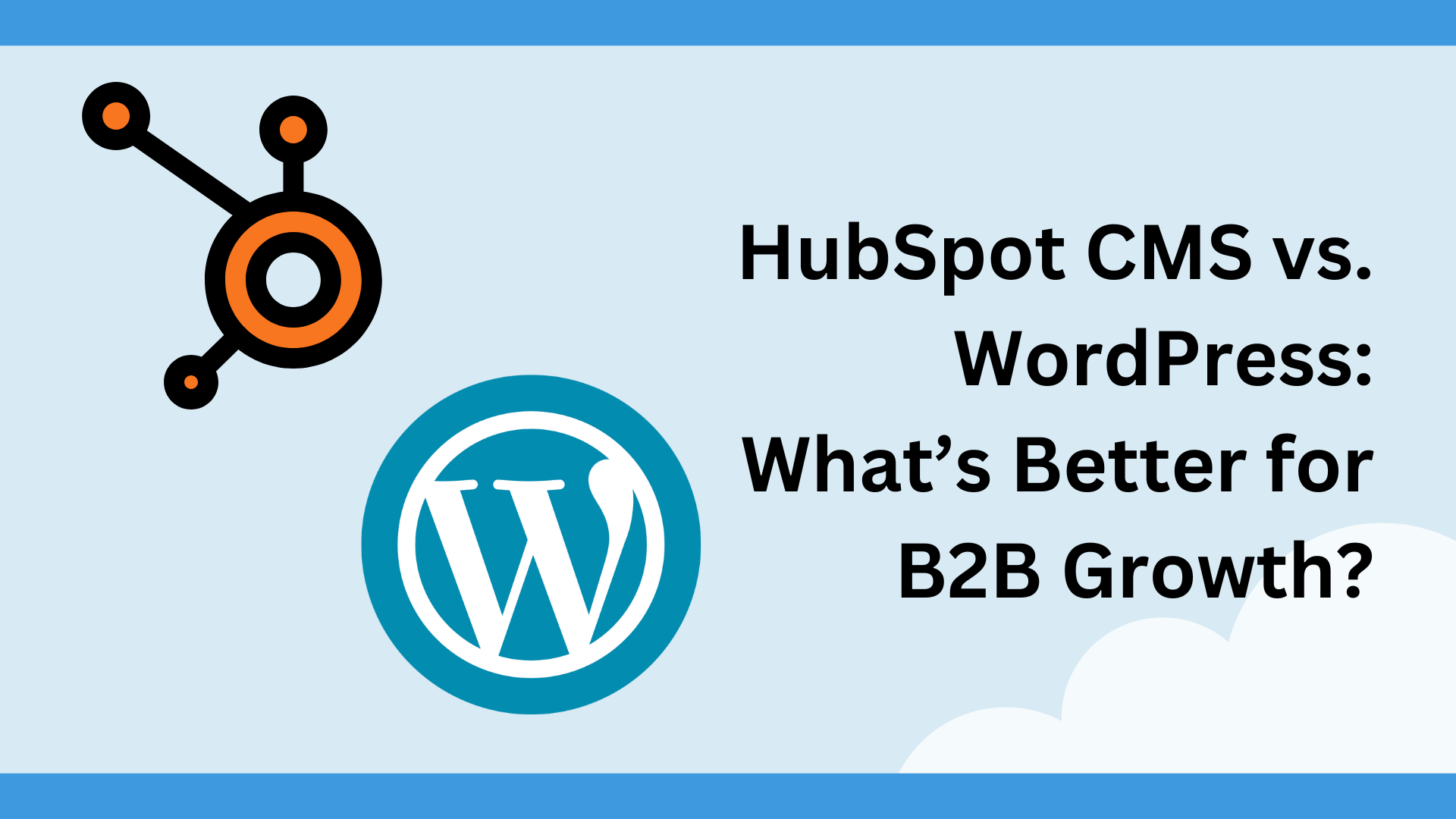When B2B companies evaluate CMS options today, the showdown boils down to HubSpot CMS vs WordPress. Both are powerful—but serve different priorities. Let’s dive into the best choice for growing your business.
1. The Case for “Best CMS for B2B”
For B2B marketers, a CMS is more than a publishing tool—it’s the front door to lead generation, conversion paths, and long-term relationships:
- HubSpot CMS (rebranded as Content Hub in 2025) is part of an all-in-one stack that integrates website, CRM, marketing automation, analytics, and support (community.hubspot.com+12mojenta.com+12perceptionsystem.com+12).
- WordPress, now powering over 62% of websites, offers unmatched flexibility with tens of thousands of plugins and themes .
So, if your goal is smooth lead capture, integrated insights, and automated workflows, HubSpot often emerges as the best CMS for B2B.
2. Ease of Use & Content Management
- HubSpot CMS review highlights a marketer-first, drag-and-drop interface, intuitive blog and landing page editors, and in-platform forms and CTAs (en.wikipedia.org+15cobloom.com+15mojenta.com+15softwareadvice.com+2ever-wonder.com+2perceptionsystem.com+2).
- WordPress is beginner-friendly for basic content editing, but deeper functionality requires plugins like Elementor or WPBakery—and technical know-how (bootstrapcreative.com).
Verdict: HubSpot wins on user-friendliness and speed for non-technical teams; WordPress offers freedom but needs more setup and upkeep.
3. Integrated Tools vs Plugin Patchwork
As a unified ecosystem:
- HubSpot includes marketing automation, SEO recommendations, CRM-driven content personalization, forms, chatbots, and analytics all in one tool (webstacks.com+3hubspot.com+3bopdesign.com+3).
- WordPress relies heavily on plugin stacks—Yoast for SEO, Gravity Forms for lead gen, and Zapier or custom APIs for CRM connections.
This illustrates a core difference in the HubSpot CMS review: it’s designed for cohesive, end-to-end B2B operations, while WordPress requires stitching together third-party tools (webstacks.com+4mojenta.com+4perceptionsystem.com+4).
4. Security, Reliability & Maintenance
- HubSpot CMS is fully managed, offering 99.95% uptime, SSL, WAF protection, DDoS mitigation, 24/7 security monitoring, and ongoing updates—no plugins, no patches (hubspot.com).
- WordPress is open-source and self-hosted, which means you’re responsible for hosting, plugin/theme updates, and security hardening. Its popularity makes it a frequent target for breaches (oneims.com).
Here’s another HubSpot CMS review highlight: for organizations that value low risk and uptime over infrastructure chores, HubSpot is the clear winner (newbreedrevenue.com+12cobloom.com+12mojenta.com+12).
5. Cost & Total Cost of Ownership
- WordPress is free to download, but costs accumulate with hosting, premium plugins, developer hours, and security services. For high traffic in B2B use cases, annual expenses often reach several thousands (ever-wonder.com+2hubspot.com+2ideagrove.com+2).
- HubSpot, on the other hand, is subscription-based. The free tier is limited. Starter starts around $25/month, Professional is $360/month ($6,000/year), and Enterprise scales higher .
Bottom line: HubSpot offers predictability and includes infrastructure and toolsets. WordPress may cost less upfront but can exceed HubSpot in total costs once you add plugins, hosting, and development fees.
6. SEO, Analytics & Conversion Optimization
- HubSpot CMS features built-in SEO recommendations, A/B testing, integrated analytics, and smart content triggers—all streamlined in the UI (bopdesign.com+5ever-wonder.com+5oneims.com+5).
- WordPress relies on SEO plugins, Google Analytics, schema generators, and separate A/B testing tools—requiring configuration, integration, and ongoing review .
While WordPress offers robust SEO capabilities with the right plugins, HubSpot shines on convenience and built-in optimization—with less manual setup.
7. CRM & Marketing Automation
This is where the HubSpot CMS vs WordPress conversation intensifies:
- HubSpot provides native CRM integration, a unified contact timeline, marketing workflows, personalization, and attribution reporting—all right inside the CMS .
- WordPress requires external CRM plugins (e.g., HubSpot plugin, Salesforce plugin) or API workarounds. These can work well but often lack the depth and polish of a fully native tool .
For B2B companies focused on pipeline manager efficiency and lead-centric marketing, this often tips the scales toward HubSpot.
8. Customization & Developer Control
- WordPress offers unmatched customization—full access to themes, plugins, code, headless architectures, and eCommerce integrations (cobloom.com).
- HubSpot CMS supports custom templates, its own HubL language, and CLI development—but with fewer themes (~230+) and requires specialized dev skills (oneims.com+9elegantthemes.com+9bopdesign.com+9).
If your site needs eCommerce, membership portals, or advanced third-party integrations, WordPress offers more creative freedom.
9. Scalability & Future-Proofing
- HubSpot scales smoothly within its tiered structure, without plugin sprawl—ideal for B2B sites requiring autonomy, stability, and integrated roadmap alignment with the CRM (bootstrapcreative.comever-wonder.com).
- WordPress scales technically, but complexity grows with site size. You’ll likely need CDN, advanced caching, developer-managed updates, and heavier infrastructure .
Still, WordPress’s vendor neutrality gives businesses full ownership and exit flexibility—something HubSpot users sacrifice.
10. Which Is “Better”? Final Verdict
|
Use Case |
HubSpot CMS |
WordPress |
|
Unifying website + CRM + marketing |
✅ Seamless |
⚠️ Plugin-heavy |
|
Ease of use for marketers |
✅ Drag-and-drop, intuitive |
⚠️ Steeper |
|
Security & maintenance |
✅ Managed, low risk |
⚠️ Requires upkeep |
|
Cost predictability |
✅ Subscription |
⚠️ Variable |
|
Developer customization |
⚠️ Limited to HubL |
✅ Full freedom |
|
E-commerce or portals |
⚠️ Limited |
✅ Strong with plugins |
|
Exit flexibility |
⚠️ Vendor lock-in |
✅ Open-source |
HubSpot CMS vs WordPress boils down to your objectives:
- Choose HubSpot CMS if you want an all-in-one, best CMS for B2B, with built-in CRM, marketing tools, and minimal technical overhead.
- Choose WordPress if your B2B site demands full control, eCommerce, or developer-heavy customization—and you're ready to manage infrastructure.
Summing It Up: A HubSpot CMS Review Takeaway
If your B2B business thrives on tight marketing-sales alignment, fast campaign launches, and predictable, secure operations—HubSpot CMS is a strong contender with full-stack benefits. But if you're technical, need granular control, or want to optimize costs, WordPress remains a powerhouse.
Recommended Next Steps
- Audit your team’s bandwidth: Do you have dev resources?
- Map your pipeline needs: Is CRM integration mission-critical?
- Budget vs. growth: Can you invest in HubSpot value?
Prototype your site: Build a landing page on each platform and measure time to publish, onboarding ease, and user experience.


.png?width=352&name=lg%20(1).png)


Leave a Comment